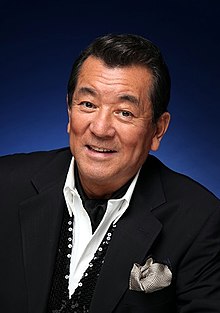Yūzō_Kayama
Yūzō Kayama (加山 雄三, Kayama Yūzō, born April 11, 1937) is a Japanese popular musician, singer-songwriter and actor.
Yūzō Kayama | |
|---|---|
加山 雄三 | |
 Kayama in 2021 | |
| Born | (1937-04-11) April 11, 1937 (age 87) |
| Occupation(s) | Musician, singer-songwriter, actor |
| Years active | 1960–2022 |
| Website | www |
This section needs expansion. You can help by adding to it. (May 2022) |

Son of mid-twentieth century film star Ken Uehara,[1][2] and actress Yoko Kozakura, (ja) Kayama graduated from Keio University.[2] Yuzo Kayama signed with Toho and made his film debut with Otoko tai Otoko directed by Senkichi Taniguchi in 1960.[2][1] He was cast in the leading role in the 1960 film Dokuritsu Gurentai Nishie directed by Kihachi Okamoto.[2] Kayama rose to stardom in the 1960s in the Wakadaishō ("Young Guy") film series.[2]
He showed his ability for drama when Akira Kurosawa cast him for his films Sanjuro and Red Beard.[1][2] In the 1970s, he starred such television dramas as Edo no Kaze and Daitsuiseki.[1]
As a guitarist, he took inspiration from the American instrumental group The Ventures, and performed a form of psychedelic surf music in the 1960s with his Mosrite guitar. One of his best-known instrumentals is "Black Sand Beach". "Kimi to Itsumademo" ("Love Forever"), another of his compositions, sold over two million copies, and was awarded a gold disc in 1965.[3] At that point it was the biggest selling disc in the Japanese recording industry's history.[3]
In March 2016, Kayama made a special art piece to commemorate 2,500,000 million downloads for the mobile game Terra Battle, that is featured as the background for the game's title screen.[4]
In 2017, he sung the 2020 Summer Olympic Games theme "Tokyo Gorin Ondo 2020", an modern adaptation of the 1964 Summer Olympic Games song "Tokyo Gorin Ondo" along enka singer Sayuri Ishikawa and rock singer Takehara Pistol (ja) .
He announced that, by the end of 2022, he would be retiring from concert activities. One of the last activities involves the song "Sarai" (ja), which he had written together with singer-songwriter Shinji Tanimura. The song was made as theme for the NTV charity program 24-Hr TV, and Kayama announced that 2022's edition of the program would be his last live performance of the song.[5]
This section needs expansion. You can help by adding to it. (May 2022) |
Films
| Year | Title | Role | Ref |
|---|---|---|---|
| 1960 | Otoko tai Otoko | Toshio Masue | |
| 1961 | Daigaku no Wakadaishō | Yuichi Tanuma | |
| 1962 | Chushingura: Hana no Maki, Yuki no Maki | Asano Naganori | |
| Ginza no Wakadaishō | Yuichi Tanuma | ||
| Nihon-ichi no Wakadaishō | Yuichi Tanuma | ||
| Sanjuro | Iori Izaka | ||
| 1963 | Sengoku Yaro | Kittan | |
| Attack Squadron! | Taki | ||
| 1964 | Yearning | Koji Morita | |
| 1965 | Eleki no Wakadaishō | Yuichi Tanuma | |
| Red Beard | Dr. Noboru Yasumoto | ||
| 1966 | The Sword of Doom | Hyoma Utsuki[6] | |
| 1967 | Scattered Clouds | Shiro Mishima | [7] |
| Japan's Longest Day | Morio Tateno | ||
| 1968 | Admiral Yamamoto | First Lieutenant Ijuin | [8] |
| 1969 | Battle of the Japan Sea | Takeo Hirose | |
| 1971 | Battle of Okinawa | Higa | |
| 1974 | ESPY | Hōjō | |
| 1977 | Mount Hakkoda | Captain Kurata | |
| 1995 | Thunderbolt | Coach Murakami |
Television
| Year | Title | Role | Ref. |
|---|---|---|---|
| 1974–1975 | Karei-naru Ichizoku | Teppei Manpyo | [9] |
| 1975–1981 | Edo no Kaze | Chiaki Joenosuke | |
| 1978 | Daitsuiseki | Eiichi Nitta | |
| 1990 | Tobu ga Gotoku | Shimazu Nariakira | |
| 2009 | KochiKame: Tokyo Beat Cops | Himself | |
| Iwakura Tomomi | |||||||||||||||||||||||||||||||||
| Iwakura Tomosada | |||||||||||||||||||||||||||||||||
| Iwakura Tomoaki | |||||||||||||||||||||||||||||||||
| Yōko Kozakura | Ken Uehara | ||||||||||||||||||||||||||||||||
| Yūzō Kayama | Megumi Matsumoto | ||||||||||||||||||||||||||||||||
| Nobuhiro Ikehata | Tetsuo Yamashita | Mayuko Azusa | Emi Ikehata | ||||||||||||||||||||||||||||||
- "加山雄三 Yuzo Kayama biography" (in Japanese). Kinema Junpo. Retrieved January 5, 2021.
- Murrells, Joseph (1978). The Book of Golden Discs (2nd ed.). London: Barrie and Jenkins Ltd. p. 192. ISBN 0-214-20512-6.
- "二宮和也『24時間テレビ45』で加山雄三とスペシャル対談決定『サライ』制作秘話などに迫る". Dwango (in Japanese). Archived from the original on August 17, 2022. Retrieved August 17, 2022.
- Stuart Galbraith IV (May 16, 2008). The Toho Studios Story: A History and Complete Filmography. Scarecrow Press. p. 227. ISBN 978-1-4616-7374-3.
- "連合艦隊司令長官 山本五十六". eiga.com. Retrieved May 25, 2023.
- "長嶋茂雄さんら9人文化勲章 功労者に加山雄三さんら". Jiji.com. Retrieved October 26, 2021.